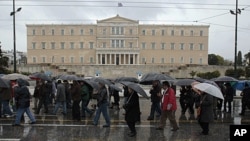The Fitch financial services company is again downgrading the credit rating of Greece, saying that the debt-ridden country is "highly likely" to default on its financial obligations even after securing a new bailout from its European neighbors.
Fitch said Wednesday it has cut Greece two notches (from CCC to C), pushing the credit standing for the Athens government deeper into junk status. The ratings company took the action after Greece earlier this week secured a new $172 billion international bailout and negotiated a $142 billion writeoff of the debt it owes large financial institutions.
While Greece has reached a general agreement on elimination of more than half the debt its owes private creditors, it must now negotiate the specific terms of the writedown with individual banks and other investors. Greek officials say that when about two-thirds of its lenders agree to cut the amount the are owed, they will impose the same debt reduction involuntarily on its remaining lenders.
Fitch said such involuntary debt cuts for the private creditors will amount to a Greek default, and called the arrangement "distressed and de facto coercive."
Greek Prime Minister Lucas Papademos says the country has a lot of work to do before it starts to collect the new bailout money, its second rescue package in two years.
The Greek parliament has agreed in principle to the package of spending and job cuts demanded by the European Union and the International Monetary Fund. The lawmakers must now pass all 79 specific measures included in the package before getting the bailout funds.
The bailout will likely avoid the bankruptcy Greece faces if it cannot pay investors $19 billion when government bonds come due, March 20th.
The rescue package requires Greece to make deep and unpopular spending cuts. They include a 22 percent cut in the country's minimum wage and the elimination of 15,000 government jobs.
Thousands of Greeks have held sometimes violent street protests against the cuts, saying they have already sacrificed enough. More protests were planned for later Wednesday.
The head of the EU delegation to the United States, Ambassador Joao Vale de Almeida, told VOA in an exclusive interview that the bloc has learned a lot from the crisis, namely the need for a mechanism to deal with emergency situations, an improved level of economic governance and solidarity among all members of the 17-nation bloc that uses the euro.
"I think we learned a lot. We learned a lot about the means that we need to have to deal with emergency situations," said the ambassador. "We didn't have them before. We created, we developed them to deal with the cases like Greece and a few other countries."
"Secondly, we learned that our governance system was not yet at the right level of sophistication, and we are in fact changing a lot; if not, there is a small revolution going on inside the euro area in the way we deal with what we call the economic governance. There is a lot being changed. And thirdly, I think we learned a very simple lesson. When you are part of a system, there has to be solidarity," he added.
Greece got a $145 billion bailout last year and is, by far, the biggest recipient of international aid in eurozone history. Yet Greece accounts for just two percent of the eurozone economy.
Some information for this report was provided by AP, AFP and Reuters.




